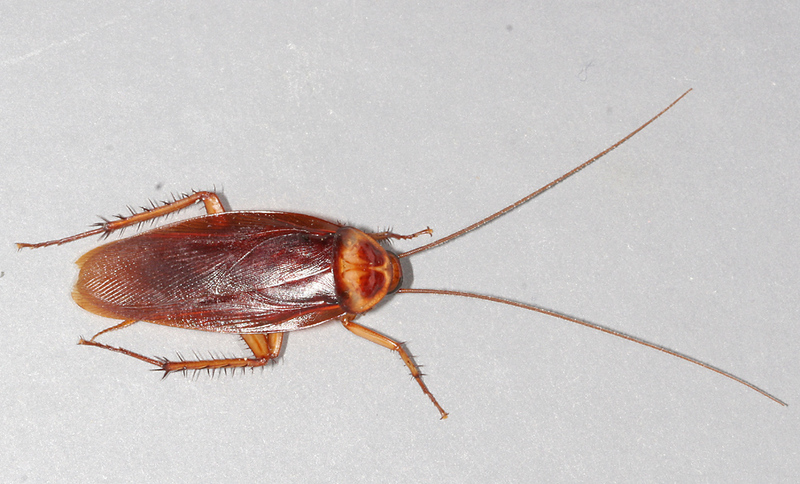|
| Query: American animal life | Result: 29th of 115 | |
American Cockroach (Periplaneta americana) - Wiki
| Subject: | American Cockroach (Periplaneta americana) - Wiki
| |

| Resolution: 1000x605
File Size: 323719 Bytes
Upload Date: 2007:09:09 21:30:31
|
American cockroach
From Wikipedia, the free encyclopedia
[Photo] The American cockroach, Periplaneta americana. Photo by Gary D. Alpert Cannon 20D http://www.uos.harvard.edu/ehs/pes_american_cockroach.shtml
The American cockroach (Periplaneta americana) is a large species of cockroach, winged, and growing to a length of 1" to 1½" (2.5 cm to 4 cm). It is very common in the southern United States, and in tropical climates, and can be found in many locations throughout the world, due to its travels via shipping and commerce between locations. In the southern U.S., it is often called a Palmetto Bug or a Waterbug. Sightings have been reported in the northeast U.S., such as in New York City, and in southeast Canada, such as in Montreal, where it is mostly found near human habitations due to its lack of cold tolerance. The American cockroach can also be found near various ports throughout the world. They are the largest species of common cockroach.
The insect is believed to have originated in Africa, but had become established in the southern U.S. by the time that it was given its name.
The insect can travel quickly, often darting out of sight when someone enters a room, and can fit into small cracks and under doors despite its fairly large size. It is known to be very mobile, and it also has wings which allow it to be quite a capable flier.
The insect is often considered a pest since it invades living quarters for sanctuary and food.
Characteristics
American cockroach adults are 1 and 1/2 inches long (38mm). They are reddish brown and have a yellowish margin on the body region behind the head. Immature cockroaches resemble adults except that they are wingless.
Habitat
American cockroaches generally live in moist areas, but can survive in dry areas if they have access to water. They prefer warm temperatures around 84 degrees Fahrenheit and do not tolerate cold temperatures. In residential areas, these cockroaches live in basements and sewers, and may move outdoors into yards during warm weather. These cockroaches are common in basements, crawl spaces, cracks and crevices of porches, foundations, and walkways adjacent to buildings. They feed on a wide variety of plant and animal material.
Life cycle
Females produce egg cases and carry them protruding from the tip of the abdomen for about two days. Egg cases are then generally placed on a surface in a hidden location. Egg cases are 3/8 inches long, brown, and purse shaped. Immature cockroaches emerge from egg cases in 6 to 8 weeks and require 6 to 12 months to mature. Adult cockroaches can live up to one year, during which females produce an average of 150 young.
Control
Due to their large size and slow development, large infestations of these insects are not common within houses. However, during certain times of the year, these cockroaches may move inside a house from outside sources. For example, in late fall these cockroaches may move indoors, seeking warmer temperatures and food. Cockroaches may enter houses via sewer connections, under doors, around plumbing, air ducts, or other openings in the foundation. Exclusion is one way to control this inward movement of cockroaches. Place fine mesh screening over crawl space vents and basement floor drains. Seal exterior doors with weather stripping. Fill gaps in walls and floors where pipes enter using expandable foam, steel wool and/or caulking compounds. Cockroach populations in basements can be reduced by decreasing dampness and applying insecticides in cracks and crevices where there is evidence of cockroach activity (presence of egg cases, dead cockroaches, brown fecal smears).
Cockroach populations around the perimeter of houses are more difficult to control. First, limit the availability of food and water. Place garbage in trash cans, not plastic bags (plastic bags rip easily). Divert water from gutters at least 3 feet away from the foundation. Secondly, reduce hiding places for the cockroaches. Do not stack firewood or debris next to the foundation. Make a visual inspection about one to two hours after sunset to locate cracks and crevices in the building from which cockroaches are emerging. Spray these areas with insecticide and seal the cracks and crevices if possible.
http://en.wikipedia.org/wiki/American_cockroach
| The text in this page is based on the copyrighted Wikipedia article shown in above URL. It is used under the GNU Free Documentation License. You may redistribute it, verbatim or modified, providing that you comply with the terms of the GFDL. |
|
Comments |
|---|
| | isobel |
|
| For ME :) |
| | Guest |
|
| UGH I have had 2 of these nasty mosters in my house now... 2 days in a row. They are huge and nasty and fast! |

|

|

|
American animal life
29/115 |

|

|
^o^
Animal Pictures Archive for smart phones
^o^
|
|
|